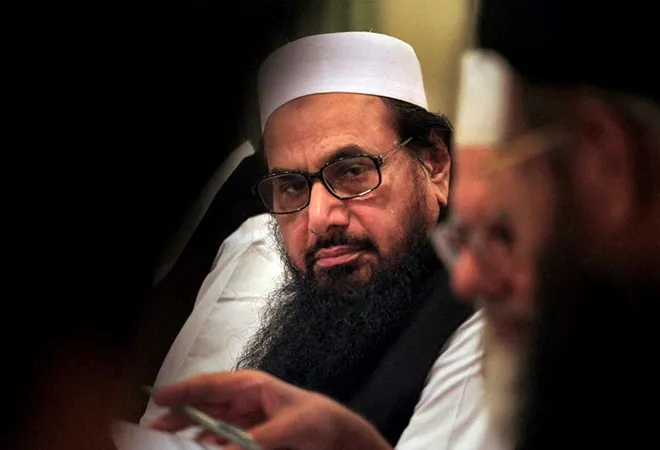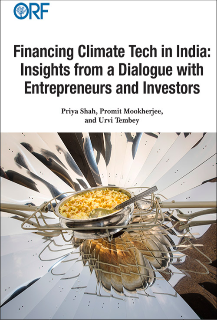
Hold off on popping the bubbly just yet over the news of the
conviction of the internationally designated Pakistani terrorist Hafiz Saeed on charges of terror financing and membership of a proscribed terrorist organisation. For all we know, the celebrations over a notorious terrorist being put behind bars might be a tad too premature.
In Pakistan, when it comes to terrorism and other such questions of high state policy, nothing is quite what it seems. It is a game of smoke and mirrors, a game Pakistan is adept at playing, and winning despite the fact that for decades its playbook has not changed: when pressure mounts and becomes unbearable, say the right things, sound sincere, and be seen to be doing the right things to buy time and space but without actually doing anything at all; once the pressure eases, and enough time and space is created, go back to doing all the bad stuff and blame it all on the infirmities and vagaries of the legal system, the independence of the judiciary, and keep promising to set things right in the future, and then repeat this entire sequence the next time pressure mounts.
The whole purpose of this strategy is to save the despicables in Pakistan by taking the
gullible folk in the US and rest of the West for a ride (which they sign on for merrily and readily, in part to fulfil some of their own tactical objectives). But there is an additional factor – China – that has also come into play. With China presiding over the FATF this year, Pakistanis think this is their best bet to get off the grey list. Even though China has always bailed out Pakistan and even exhorted the international community to support Pakistan and appreciate the ‘sacrifices’ Pakistan has made in fighting against terrorism, the FATF under Chinese presidency had
warned Pakistan in October last that if adequate progress was not made by this February, “FATF will take action, which could include the FATF calling on its members and urging all jurisdictions to advise their FIs to give special attention to business relations and transactions with Pakistan.” By convicting Saeed, Pakistan has given its ‘iron brother’ something to work with to bail out Pakistan once again. This is important not just for Pakistan, but also for China which has invested tens of billions of dollars in Pakistan and if Pakistan is black-listed, China would have to incur a huge loss. Saeed could well be the key that not only saves the economic part of the China-Pakistan relationship but also the strategic part.
Other than those who wallow in their naïveté on Pakistan, everyone else will see the latest gambit of Pakistan with a healthy dose of scepticism. After all, this is a movie that has played out so many times in the past. Like any formula Bollywood film, the story line is the same, only the ‘treatment’ is different. Hafiz Saeed has been detained/arrested, even prosecuted, many times before – after the attack on the Indian parliament in 2001, after the 26/11 attacks in Mumbai, in 2017 after Pakistan was allegedly
threatened with sanctions by the US, and lastly in July 2019 when he was arrested on
charges of terror finance because of the FATF pressure. Except in the latest instance when he has been convicted, in all previous cases the Pakistani courts invariably came to his rescue. Unlike most other countries where the judicial system is used to punish and penalise terrorists, in Pakistan the courts are used to shield and protect terrorists and give them respectability that comes from acquittal or a ruling of wrongful confinement.
Given that Saeed has been convicted by a trial court, he will definitely appeal the verdict. Having proven their “bonafides” by securing his conviction in the lower court, the Pakistani authorities can conveniently claim innocence if the High Court sets aside the verdict of the trial court. The plea Pakistan will take is a plea it has taken so many times in the past: the judiciary is independent and government cannot influence the judgments. This is shorthand for “if you don’t like it, lump it”. Chances are that there will be enough glaring loopholes left in the trial court judgment that will allow the High Court to grant relief to Saeed, but only after the conviction serves its primary purpose, which is to convince the FATF and other international organisations and influential countries, that Pakistan is indeed delivering on its commitments on cracking down on terrorism and terrorists.
Timing is everything in such instances. Next week, the FATF is meeting in Paris where Pakistan’s case is likely to come up for discussion. At this meeting the decision will be taken on whether to push Pakistan into the black-list (highly unlikely), keep it on the grey-list (highly likely) or clear Pakistan and take it out of the grey-list (quite unlikely). Pakistan seems more or less reconciled to staying on the grey list for some more time but it is believed that the Saeed conviction will help in making its case at the FATF plenary and eventually getting it out off the grey list later this year. This is however a tack that the Pakistanis have played repeatedly after they were put in the grey list in 2018. Since then, just before every FATF meeting there would be a flurry of activity and big announcements of measures Pakistan was taking to become compliant with FATF requirements. On cue, the pliable Pakistani media would go into an overdrive highlighting all the great work being done on FATF and express great confidence that FATF would have no choice but to let Pakistan off the hook. Unfortunately for Pakistan, the FATF had smartened up and refused to get taken in by Pakistan's eyewash actions. When put through the mill of searching questions, Pakistani officials would fumble for answers because while on paper a lot was done
, on ground virtually nothing was done to curb money laundering and terror finance.
Clearly, the Pakistanis never expected their feet to be held to fire because this sort of a thing had never all the years when they adopted similar tactics with the US in the War on Terror in Afghanistan. For more than a decade after 9/11, every time a top US official was visiting Pakistan or a Pakistani official was visiting US, magically a high value terrorist used to get arrested and presented to the Americans, who would readily cut some slack for the Pakistanis because they thought that maybe the Pakistanis were finally getting ready to deliver. Having made stringing the Americans along into a fine art form, the Pakistanis believed they could deceive the FATF similarly. Saeed’s sentencing is therefore nothing more than the same old plot with some variation.
With Saeed having been convicted, it will be interesting to watch how the Pakistanis play this one out. There are broadly three or four scenarios. The first is that as soon as the FATF meeting is over, Saeed will appeal in the High Court (most probably Lahore), where after a couple of hearings he will be granted bail and the case will meander along endlessly. The Pakistanis will pull a long face, claim the courts are independent, declare they will appeal in the Supreme Court and will take the case to its logical conclusion, which is another way of saying its end of the road for this case.
The second possibility is that the Pakistani ‘deep state’ will reach out to Saeed. It will explain to him that it’s in a terrible bind and that as the most loyal and patriotic Pakistani, Saaed will be asked to sacrifice a little for the country. This means that he will stay in prison for a couple of years after which he will be released. This will earn Pakistan all the points and prove its ‘sincerity’. Saeed will of course be kept in five star comfort in ‘prison’. He will also be allowed to communicate with his associates, retain control over his terrorist cadre, albeit by remote and will remain an important part of the Pakistani ‘deep state’s’ sinister agenda of continuing to use jihadist terrorism as a pillar of the state’s foreign and security policy. A variant of this could be that while Saeed will be kept in all the comfort and will be able to meet and communicate with whoever he wants (obviously below the radar screen), he will be asked to relinquish an active role over the terrorist infrastructure he had built. In other words, a new leadership with a new name will come into play, taking care that there is no direct connection that can be drawn between the old Lashkar-e-Taiba/Jamaatud Dawa and the new entity. The foot-soldiers will probably be of the LeT/JuD but since the outfit will operate from the shadows and not have the sort of visibility and public relations outreach that LeT/JuD had, no one will be able to link them.
The final possibility is that Saeed will actually be thrown under the bus. The fact is that he is damaged goods. More than an asset he has become something of a liability and therefore needs to be disavowed. The Pakistani ‘deep state’ could calculate that it stands to gain a lot more by keeping Saeed in jail or removing him from the scene than by continuing to protect him. But as yet, there is no sign that this is indeed the case. The infrastructure of terror that Saeed and other Pakistani terrorist warlords have built remains intact and is not being dismantled. The cadres of the organisations that are on the radar of the international community has only been asked to
lie low until the pressure dissipates. But even in the highly unlikely event that Saeed is junked by the Pakistani establishment, it will not mean that jihad as an instrument, nay pillar, of state policy is also being junked. Far from it, Pakistan will continue to embrace jihad as a central element of its strategy because without it Pakistan has nothing in its arsenal. Therefore, hold off on popping the bubbly just yet.
The views expressed above belong to the author(s). ORF research and analyses now available on Telegram! Click here to access our curated content — blogs, longforms and interviews.



 Hold off on popping the bubbly just yet over the news of the
Hold off on popping the bubbly just yet over the news of the  PREV
PREV


